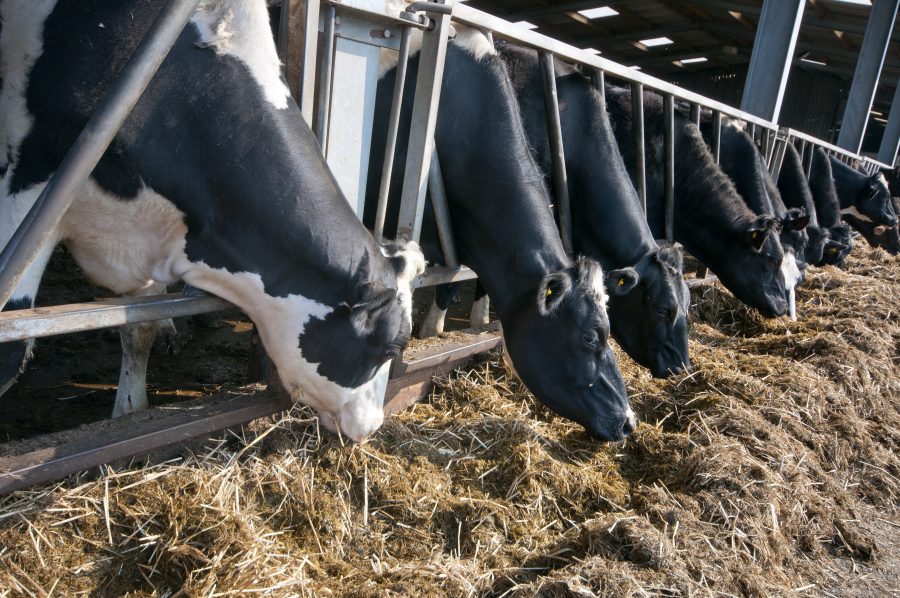Bovaer® is safe, but the industry needs to make sure the public is ‘on board’ when taking new initiatives aimed at tackling environmental issues, a leading NFU spokesman has stressed.
NFU Dairy Board chair Paul Tompkins made the comments following an online furore over the use of the supplement in trials looking at its ability to reduce the level of methane emissions from cows.
With social media channels showing activists pouring milk away in protest at the use of Bovaer in a trial at around 30 farms in the UK, the NFU was quick to stress that the additive, which the manufacturers claim can reduce enteric methane emissions from cows by an average of 27%, was both approved and safe.
But Paul was careful to point out that the public backlash against something the industry has generally welcomed was “a valuable reminder that we must tread the path towards sustainability with care and wider engagement”.
In a statement, the NFU said it had “played an active role in a government-led round table focused on methane inhibitors as we recognise the role they could play in supporting sustainable food supply chains” and pointed out that DEFRA had, in October 2023, renewed its commitment to reducing emissions in livestock by encouraging the use of methane-reducing feed products.
But it stressed that the organisation had “been very clear that any new product or innovation needs to work in real-life situations, suit a range of farm systems and be incentivised alongside a range of other greenhouse gas emission-reducing techniques, such as genetics, efficiency improvements and new technologies”.
It went on: “We have also stressed the need for robust risk assessments to consider the impact of each product on animal health and welfare, food safety and the wider environment.”
On the question of safety, the NFU pointed out that Bovaer had been approved and was considered safe by the Food Standards Agency (FSA) in the UK and by similar authorities in more than 68 countries across the world including Europe, Australia, Canada, North America and Brazil.
It added: “Regulatory and scientific trials, which have taken place over the last 15 years, have demonstrated that Bovaer does not pose a risk to health for consumers or animals”. It is designed to break down in the cows’ digestive systems and quickly decompose into naturally occurring compounds already present in the rumen.
Paul Tompkins said it had been “comforting to see in recent days the depth of feeling our customers share with farmers when it comes to the quality of the food we produce”, adding: “Only by exhausting a robust certification process, with health approvals and extensive trials, should any new feed product be introduced into our cows’ diets.”
He said that while FSA-approved products could be “useful tools in helping to reduce methane emissions and supporting sustainable supply chains”, there were questions over their “long-term efficacy, how they can be used practically and effectively on different farm systems, cost and, importantly, consumer buy-in”.
He went on: “This latest trial, on a product which has already been approved by the FSA as safe for consumers, could help provide some of this evidence.”
The British Society of Animal Science (BSAS) also lent its weight to the use of the additive, pointing out: “Methane is a potent greenhouse gas, and feed additives, including Bovaer, represent a promising step forward in reducing methane emissions from ruminant livestock. Innovation in this area plays a key role in supporting planetary health, sustainability and global food security.”
The society added: “The product has undergone rigorous risk assessments in multiple jurisdictions, evaluating its safety for animals, humans handling the product, consumers and the environment.
“These evaluations, including a detailed review by the UK’s Advisory Committee on Animal Feedingstuffs (ACAF), have concluded that Bovaer is safe for all stakeholders and effective in reducing methane emissions when used as directed.”
In another nod towards the need to keep the public on board, the statement added that “transparency from industry and regulatory bodies” was “crucial in helping the public understand the thorough processes that underpin product approval”, pointing out: “Clear communication about safety and efficacy, supported by peer reviewed science, can bridge the gap between scientific innovation and societal acceptance.”







